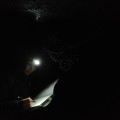Interrogating the limits of (im)perceptibility
Interrogating the Limits of Imperceptibility formed a double panel at The American Association of Geographers Conference, Chicago, 2015. The panel was co- organised with Dr Rebecca Ellis ( Lancaster University) and Dr Astrid Schrader ( Exeter University).
Session Title: Interrogating The Limits of (Im)Perceptibility
Organisers: Sarah Casey (Lancaster University), Rebecca Ellis (Lancaster University), Astrid Schrader (Exeter University)
This panel takes inspiration from three converging moves at the intersection of nonhuman geography, post humanist theory and STS. For many geographers and social theorists, the current environmental crisis necessitates not only a shift from the centrality of the bios to the geos in configurations of the political, but also an expansion of the ‘geo’-political beyond the terrestrial to cosmologic entities and forces (see e.g. Yusoff, Clark, Povinelli, Colebrook). These two moves are combined with a call to consider the imperceptible, insensible, unknowable, indeterminate – those entities, forces and processes which lie beyond present human and technological modes of sensing – as resources for rethinking the limits of materiality, ontology and the political both within and beyond human knowledge projects (see e.g. Barad, Ellis, Schrader, Waterton, Yusoff).
In this context, this panel is interested in the specific challenges posed by the imperceptible etc.to the social sciences and the humanities in their engagement with the biological and physical sciences. How do different disciplinary approaches and modes of knowledge production figure the imperceptible etc. differently? How do different disciplines negotiate the limits posed by the imperceptible etc. to their practices and their imagination? How for example does the role of invisible dark matter and energy in cosmology compare to the invisible biome in biology/ecology? How does contemporary art purposefully engage with the imperceptible, be it by engaging the unknown in the making process (Fisher & Fortnum, 2013) or in endeavours to sense, reveal and represent the invisible (Kemp 2006)?
The panel included contributions from the social sciences and humanities; additional questions to be explored may include:
- Is there a way to formulate imperceptibility, invisibility, insensibility beyond anthropocentric conceptions of knowledge production?
- What might be the role of intuition and imagination in accounting for the imperceptible?
- What are the roles of ‘proxies’ or ‘sentinels’ for approaching the imperceptible and what are their ontological status?
- How do different scales and locations of imperceptibility challenge human levels of receptivity and responsiveness to current planetary challenges?
- What does it mean to account for the imperceptible beyond technological limitations?



